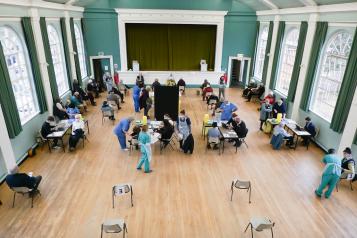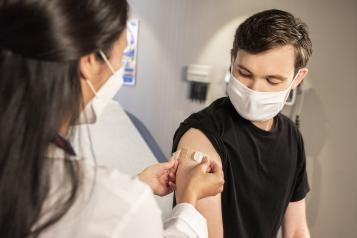Information on coronavirus
Updated 28 February 2022
For the most up to date information about Covid-19 be sure to check gov.uk/coronavirus
Government unveils 'Living with Covid' plan
As of 24 February 2022, all restrictions have been removed and the legal requirement to self-isolate has ended. The changes include:
- Until 1 April, people who test positive are advised to stay at home and avoid contact with other people for at least 5 full days, and until they have received two negative test results on consecutive days.
- Fully vaccinated adults and those aged under 18 who are close contacts are no longer advised to test daily for seven days and the legal requirement for close contacts who are not fully vaccinated to self-isolate has been removed.
If you think you might have coronavirus
Symptoms
-
A high temperature
- A new, continuous cough
-
Loss or change in sense of smell or taste
Most people with symptoms have at least one of these.
Many people with Covid-19 do not have symptoms but can still infect others. This is why everyone is advised to get tested regularly.
Find out about regular rapid Covid-19 tests
What to do if you have these symptoms
- Get a PCR test to check if you have Covid-19.
- You and anyone you live with should stay at home and not have visitors until you get your test result.
Find out more and order a PCR test
Get help from NHS 111 if:
- You are worried about your symptoms
- You are not sure what to do
When to stay at home
While you’re no longer required by law to self-isolate if you have Covid-19, you should still stay at home and avoid contact with other people.
This can be for up to 10 days from when your symptoms start, although many people will no longer be infectious to others after 5 days.
You can do a rapid lateral flow test from 5 days after your symptoms started (or the day you had the test if you do not have symptoms) and another the next day.
If both tests are negative and you do not have a high temperature, you're less likely to pass Covid-19 to others and you can go back to your normal routine.
If your test result is positive on day 5, you can carry on doing rapid lateral flow tests every day until you get 2 negative test results in a row.
Do
- Stay at home if you can – this helps reduce the number of people you have contact with
- Ask friends, family, neighbours or volunteers to get food and other essentials for you
- Cancel any routine medical or dental appointments
Don't
- Go to work, school or public places
- Have visitors in your home, except for people providing essential care or services
If you need to leave your home
- Avoid contact with anyone who is at high risk of Covid-19
- Avoid crowded places, such as public transport at busy times
- Limit close contact with those you live with - wear a face covering, meet outside and stay 2m apart if you can
- Wash your hands or use hand sanitiser regularly
When to stay at home and what to do
Stay at home guidance for people with suspected or confirmed Covid-19
Stay at home guidance for contacts of people with confirmed Covid-19
How to avoid catching or spreading germs
Do
-
Cover your mouth and nose with a tissue or your sleeve (not your hands) when you cough or sneeze.
-
Put used tissues in the bin straight away.
-
Wash your hands with soap and water often – use hand sanitiser gel if soap and water are not available.
-
Try to avoid close contact with people who are unwell.
Don't
-
Touch your eyes, nose or mouth if your hands are not clean.
Face coverings - when to wear one
- While face coverings are no longer a legal requirement in most indoor settings, it is still recommended that you wear a one in enclosed or crowded spaces where you might come into contact with people you might not normally meet.
- They are not required in hospitality venues where food and drinks are consumed, such as pubs and cafes, during exercise, such as in the gym, or when dancing, such as in a nightclub.
- But face coverings remain a requirement in healthcare settings such as hospitals, care homes and GP surgeries.
- Some major retailers are also asking staff and customers to keep wearing a face covering.
Keep playing your part
You can still reduce the risk of catching and passing on Covid-19 by:
- Getting vaccinated
- Letting fresh air in if meeting indoors, or meeting outside
- Wearing a face covering in crowded and enclosed spaces, especially where you come into contact with people you do not usually meet, when rates of transmission are high
- Trying to stay at home if you are unwell
- Taking a test if you have Covid-19 symptoms
- Staying at home and avoiding contact with other people if you test positive
- Washing your hands and following advice to ‘Catch it, Bin it, Kill it’.
Easy read information on coronavirus
Further information
NHS England has produced a list of common questions about coronavirus, covering advice for you and your family, how it's caught and spread, prevention, self-isolation, testing and treatment and foreign travel.
Other places for information:

